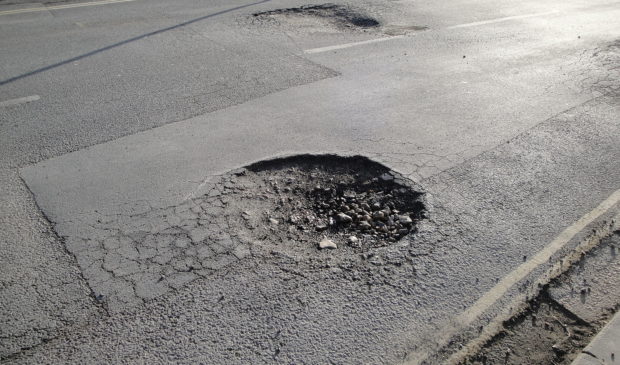Fixing street cut repair program to take time
Friday, March 31, 2017 by
Jo Clifton City Council Member Ellen Troxclair said she was “really alarmed” when she read the Office of the City Auditor report showing that the city has a 3.6-year backlog in repairing potholes created by utility crews fixing water lines. That’s the number even if there were no new street cuts during that time.
Members of the team from the city auditor’s office, which studied street cuts made by the water utility and subsequent repairs by the Public Works Department, determined that as of March 2016 “there was a backlog of 3,864 utility cut patches awaiting a permanent” repair.
In Public Works’ response to the audit recommendations, the writers said that as of March 17, “data analysis and cleanup of the work order system has resulted in a more accurate backlog number of 2,204.” Austin Water agrees with that number.
Troxclair is chair of the Council Audit & Finance Committee, which accepted the audit and heard a report from auditors and city staff on Wednesday.
Troxclair said, quoting an unnamed person, “We’re so proud of all the bells and whistles that we have at the city, but as the audit shows, sometimes we’re not doing the basics very well. When you think of what is the most basic job of city government, filling potholes certainly rises to the top. These are utility cuts, but they’re potholes.”
Troxclair added, “So we have to make sure our basic city services are prioritized in our budget process – that we’re doing the basics well.” She said it was the sort of thing that she hears about from her constituents. “They are annoyed that the utility comes through, cuts a hole in the street outside their house, and it takes a year to get it fixed,” she concluded.
Auditors also found that some of the “patches,” or temporary repairs made by the water utility, were unreliable and might be unsafe because of how long it took Public Works to do the final repairs.
Auditors noted that the backlog continued to grow between October 1, 2013, and March 2016, the period audited. However, they also reported that street repairs are not a new problem, writing, “A backlog was also noted in a November 1998 audit report from the City Auditor.”
One of the problems pointed out by auditors is that the water utility has more resources and more employees devoted to making street cuts and doing temporary repairs than Public Works has to do the final repairs. Austin Water has 22 crews with 107 employees. Public Works has just four crews with 53 employees.
The utility requests on average 185 repairs each month after repairing broken water lines and doing patches, but the crews working to do those repairs complete only about 89 repairs each month. So, it’s not difficult to see how the repair crews are falling behind.
Auditors also criticized Public Works for failing to maintain complete and consistent data in order to determine the size of the backlog at any particular time.
The two departments promised to work together to solve the backlog problem.
But that will take time and money.
Rick Coronado, assistant director for operations at Austin Water, said the utility has its own maintenance and management system in which they track their assets, repairs and work orders sent to Public Works. On average, he said, they send about 2,200 such orders each year.
Those orders are only for emergency repairs, not for Capital Improvement Projects, which are handled through a different management system. Contractors hired to work on CIP projects do their own repairs, Coronado said.
Currently, Austin Water has budgeted about $10 million a year to spend on repairs done by Public Works.
Coronado said what the utility and Public Works are calling the “Get Well” plan for street repairs will cost about $15 million a year over a span of 18 months to two years. The two departments will work together to establish two IDIQ contracts. IDIQ stands for indefinite delivery/indefinite quantity. One contract will be to handle concrete repairs and the other will handle asphalt repairs.
The proposed implementation date for those contracts is April 2019.
In the meantime, the director of Public Works and his team have a lot of work to do updating their procedures to ensure that work orders are complete and accurate, according to the audit.
Auditors found that Public Works does not have enough data to determine the cost-effectiveness of street repairs or to verify the true backlog. That’s also on their list of things to do.
The audit pointed out that temporary repairs are left on the ground far too long and that different members of Public Works had different ideas about which temporary repairs they should work on first. Some thought the oldest patches should be addressed first, while others thought they should first address the ones about which they received complaints.
Public Works and Austin Water also said they will work together to develop new processes for temporary repairs. Staff said the implementation date for that part of the project is September.
Download (PDF, 6.57MB)
Photo by Editor5807 (Own work) [GFDL or CC BY 3.0], via Wikimedia Commons.
The Austin Monitor’s work is made possible by donations from the community. Though our reporting covers donors from time to time, we are careful to keep business and editorial efforts separate while maintaining transparency. A complete list of donors is available here, and our code of ethics is explained here.
You're a community leader
And we’re honored you look to us for serious, in-depth news. You know a strong community needs local and dedicated watchdog reporting. We’re here for you and that won’t change. Now will you take the powerful next step and support our nonprofit news organization?



